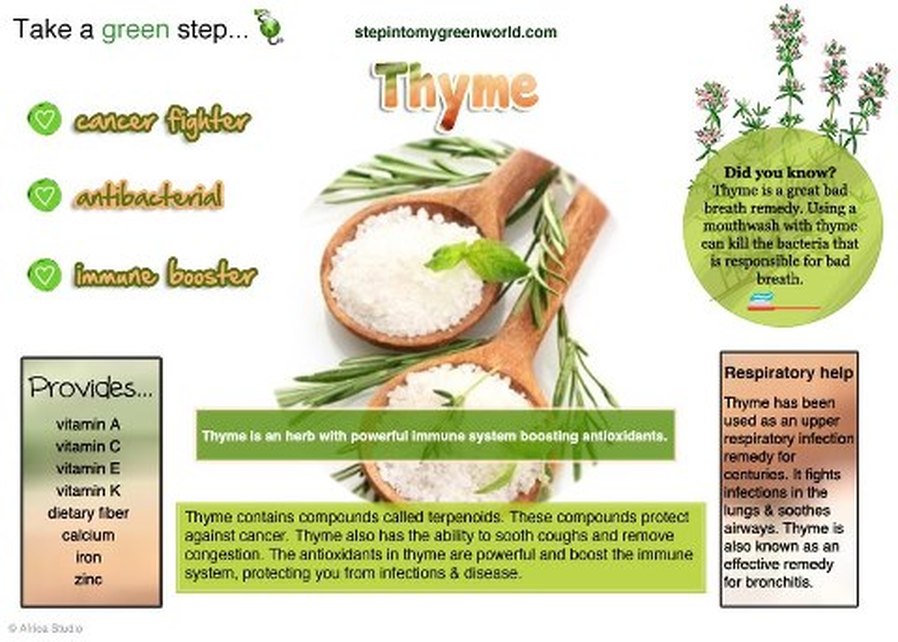
The health benefits of thyme include relief from respiratory and gastrointestinal problems, improved mental acuity and protection from cancer-causing toxins. These benefits are the result of thyme’s rich antioxidant content.
Thyme contains a variety of important bioflavonoids and volatile oils, including thymol. Thymol is an essential oil that has very powerful antioxidant properties. Because of its unique blend of antioxidants, thyme is considered one of the top antioxidant foods around.
Thyme is also a powerful antiseptic and antibacterial agent. Many herbal medicinal preparations contain thyme or one of its essential oils.
Thyme is a very good source of calcium, iron, manganese, chromium, vitamin K and fiber.
Herbs and Spices are Some of the Top Antioxidant Foods
It’s a little-known fact that herbs (and spices) such as thyme have far greater concentrations of antioxidants than any common fruit or vegetable. Herbs also contain a particularly wide variety of antioxidants as well, making them one of the top antioxidant foods around.
Here are 10 reasons to use thyme:
- Mouthwash: The herb thyme contains a natural oil known as thymus vulgaris, which is at least 25 percent thymol, a natural antiseptic. In other words, thyme contains a pretty strong natural antiseptic. So, if you're in need of a clean mouth but don't have any mouthwash from the store, look to see if you've got some thyme in your kitchen cupboards. If so, chew a little of the thyme. It will help to
cleanse your mouth and rid it of germs. Thymol is even one of the ingredients in Listerine. - Antioxidants: Thyme also contains flavonoids, natural antioxidants. And what do antioxidants do? They work through the bloodstream to help the body's cells heal themselves from internal damage. Antioxidants can be important in helping to prevent heart disease and possibly even some forms of cancer.
- Blood pressure: Thyme has its fair share of potassium, too. And potassium is good for the bloodstream and the blood pressure. Potassium helps the body to control the heart rate, and it also helps to cleanse the bloodstream of detrimental materials.
- Wounds: Because of its natural abilities as an antiseptic, thyme is known to be good for cleansing minor wounds, such as small cuts and the like. The thymol in thyme helps to prevent bacteria from growing on and within wounds, and acts to help prevent infection.
- Coughing: The thymol in thyme is not only a great natural antiseptic, but it's also a great expectorant. What does that mean? It means thyme is good for helping to ease coughs and the pains sometimes associated with coughing. Try brewing a little thyme in hot water, a thyme tea if you will, and gargling it for a few minutes. This not only helps with coughs, but can aid in easing a sore throat.
- Digestion: There is also a fair amount of fiber in thyme, making this herb an excellent choice when suffering from stomach and bowel troubles. Try a little time if you are having minor stomach cramps or are suffering from diarrhea or constipation. But if your problems worsen or continue for more than a short amount of time, always remember to go see a doctor.
- Diuretic: Thyme can naturally urge your body to shed excess fluid and some sodium and toxins. Sodium makes the body hold fluid, while a diuretic helps to body to get rid of extra fluid. Extra fluid can be rough on the heart, in severe cases even leading to congestive heart disease. Thyme as a diuretic would likely work best in a tea or oil form.
- Cleaning: Using thyme to make a tea, then pouring the tea into a spray bottle and using it as a cleaning product is a good way to destroy mildew and other bacterias. Remember all that thymol in thyme? That's what does the cleaning job.
- Menstrual cramps: Thyme is also a natural antispasmodic, which means it has the ability to help with menstrual cramps and the pains caused by such.
- Ringworm: Thyme is known as a killer of parasitic intestinal worms, such as ringworm. Drinking a little thyme tea and rubbing some thyme or thyme oil on the skin can help to get rid of ringworm. However, keep in mind raw thyme or thyme oil can cause a skin reaction in some people.